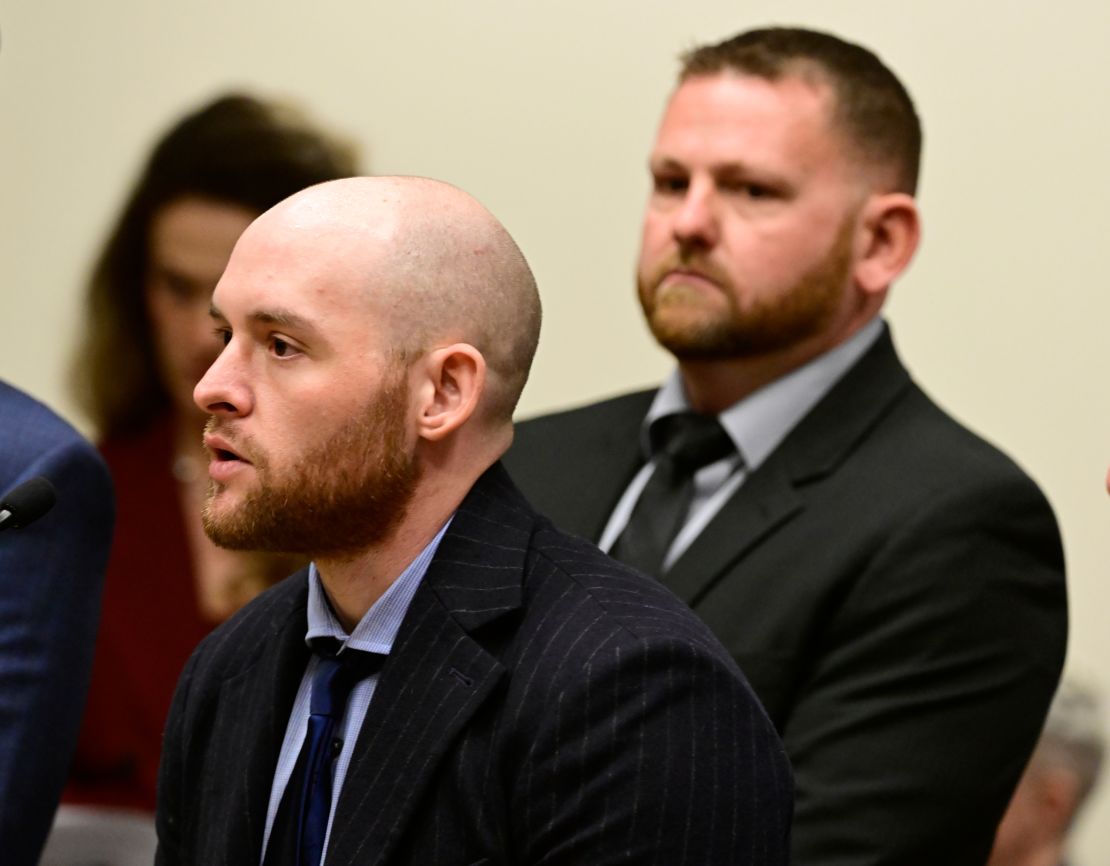Randy Roedema, one of the Aurora, Colorado, police officers who arrested Elijah McClain, an unarmed 23-year-old Black man who died after he was subdued by police and injected with ketamine by paramedics in 2019, was found guilty of criminally negligent homicide and assault by a jury on Thursday.
At the same time, a second officer, Jason Rosenblatt, was acquitted of all charges against him, including reckless manslaughter and assault.
The jury reached a verdict after deliberating for 16 hours over three days.
Rosenblatt hugged both of his attorneys and wiped away tears after his verdict was announced. He also hugged members of Roedema’s family.
Reid Elkus, an attorney for Roedema, comforted the officer’s wife after the verdict, saying, “He may not go to jail.” Roedema’s sentencing has been scheduled for January 5.
“He’s OK. He’s OK. It’s not mandatory,” Elkus told Roedema’s wife.
Sheneen McClain, Elijah McClain’s mother, told CNN affiliate KUSA after the verdict, “This is not justice.” She said Roedema’s guilty verdict is “not enough,” adding the officer was not acting alone in what led to her son’s death.
“This is not a victory for me at all. This is not a victory for the human race. This is not justice,” Sheneen McClain told KUSA. “They have an eternal judgment that they have yet to see. And no matter how they try to clean up their slate, they still have my son’s blood on their hands.”
Colorado Attorney General Phil Weiser said he hopes the verdict can help the community heal.
“Everyone in Colorado, everyone in the United States, no matter who you are, is accountable under the law. Hopefully today’s verdict can be a sign for healing for the Aurora community and for our state,” Weiser said.
One of the ways to honor McClain’s memory is to improve policing practices and build trust between law enforcement and the community, Weiser said.
In closing arguments of the weekslong trial on Tuesday, prosecutors said Roedema and Rosenblatt used excessive force, failed to follow their training and misled paramedics about his health status.
The officers “chose force at every opportunity,” instead of trying to de-escalate the situation as they’re trained, prosecutor Duane Lyons told the court.
Meanwhile, defense attorneys placed blame on the paramedics and on McClain himself.
Roedema and Rosenblatt both pleaded not guilty to charges of reckless manslaughter and assault in connection with McClain’s death. Rosenblatt was fired by the police department in 2020 and Roedema remains suspended.
Rosenblatt’s attorney, Harvey Steinberg, painted his client as a “scapegoat” and said it’s the paramedics’ responsibility to evaluate a patient’s medical condition. Roedema’s attorney, Don Sisson, said his client’s use of force was justified because McClain resisted arrest. He said McClain had been given 34 commands to either “stop” or “stop fighting.”
The case focused on the events of August 24, 2019, when officers responded to a call about a “suspicious person” wearing a ski mask, according to the indictment. The officers confronted McClain, a massage therapist, musician and animal lover who was walking home from a convenience store carrying a plastic bag with iced tea.
In an interaction captured on body camera footage, police wrestled McClain to the ground and placed him in a carotid hold, and paramedics later injected him with the powerful sedative ketamine. He suffered a heart attack on the way to a hospital and was pronounced dead three days later.
Prosecutors initially declined to bring charges, but the case received renewed scrutiny following the nationwide Black Lives Matter protests in spring 2020. Colorado Gov. Jared Polis appointed a special prosecutor to reexamine the case, and in 2021 a grand jury indicted three officers and two paramedics in McClain’s death.
A third officer, Nathan Woodyard, and two paramedics who treated McClain, Jeremy Cooper and Peter Cichuniec, are set to go on trial in the coming weeks. They have also pleaded not guilty.
In a statement following the verdicts Thursday, Aurora Police Department Chief Art Acevedo said on X, formerly known as Twitter, “We respect the verdict handed down by the jury, and thank the members of the jury for their thoughtful deliberation and service. Due to the additional pending trials, the Aurora Police Department is precluded from further comment at this time.”
How McClain died was a key focus in the trial

The trial began last month and featured testimony from Aurora law enforcement officers who responded to the scene as well as from doctors who analyzed how McClain died. The defense did not call any witnesses.
In closing arguments, the prosecution played body-camera footage of the arrest and said the footage showed officers used excessive force for no reason. McClain also repeatedly said he couldn’t breathe, yet the officers did not tell that to anyone on the scene.
“His name was Elijah McClain, and he was going home. He was somebody. He mattered,” prosecutor Lyons began his argument Tuesday afternoon.
A key focus of the trial was analysis of how McClain died and whether the officers’ actions caused his death.
The jury heard from a pulmonary critical care physician who testified he believed the young man would not have died if the paramedics had recognized his issues and intervened.
Dr. Robert Mitchell Jr., a forensic pathologist who reviewed McClain’s autopsy, testified the cause of death was “complications following acute ketamine administration during violent subdual and restraint by law enforcement, emergency response personnel.” He testified there was a “direct causal link” between the officers’ actions and McClain’s death.
Meanwhile, defense attorneys argued there was no evidence the officers’ actions led to his death, and instead pointed to the ketamine injection.
Though an initial autopsy report said the cause of death was undetermined, an amended report publicly released in 2022 listed “complications of ketamine administration following forcible restraint” as the cause of death. The manner of death was undetermined.
Dr. Stephen Cina, the pathologist who signed the autopsy report, wrote he saw no evidence injuries inflicted by police contributed to McClain’s death, and McClain “would most likely be alive but for the administration of ketamine.”
In the prosecution’s rebuttal, Jason Slothouber told the court while the officers did not inject McClain with the ketamine, their failure to protect McClain’s airway allowed him to become hypoxic then acidotic, and that’s what made the ketamine so dangerous to McClain.
Officers didn’t provide accurate information to the paramedics when they arrived on scene, and in doing so they “failed Elijah McClain,” Slothouber said.



